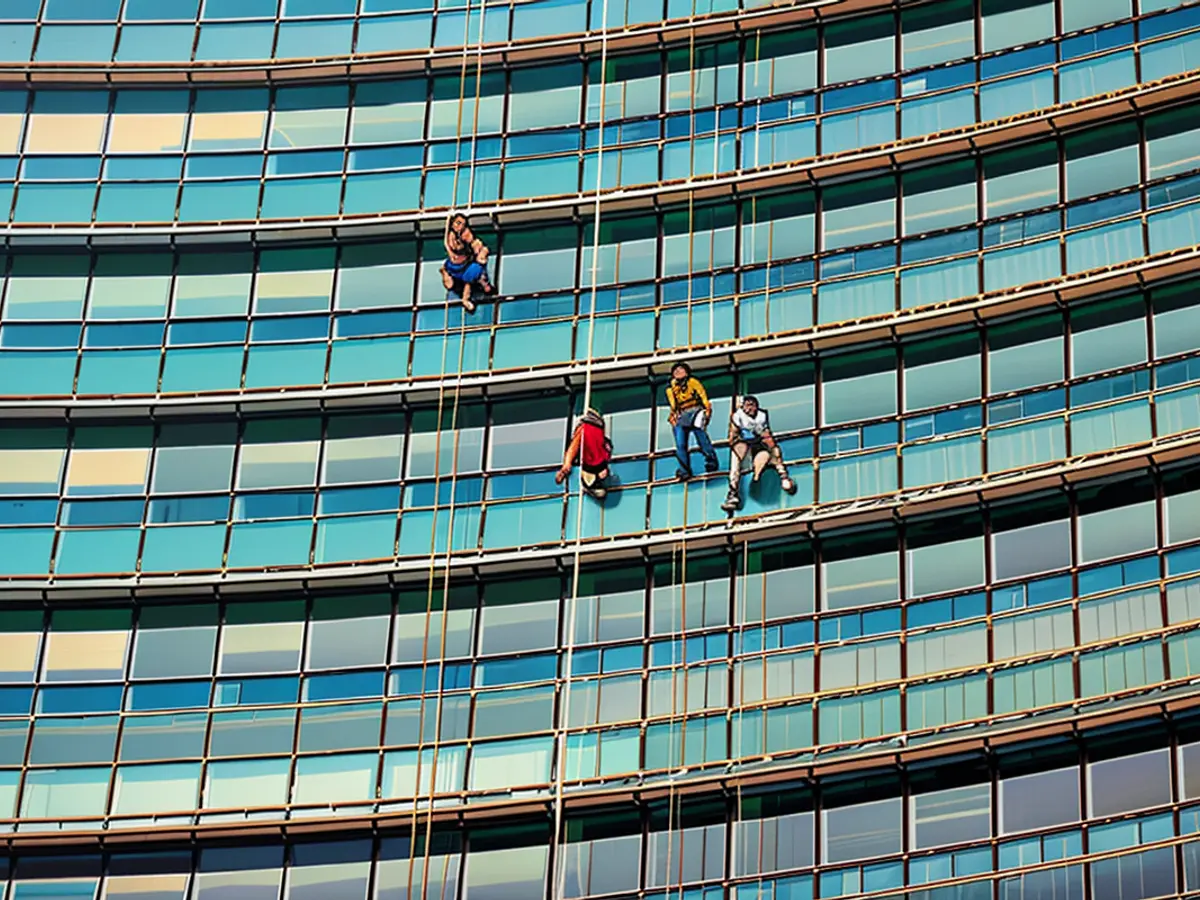What is the Typical Salary for Cleaning Professionals?
Hard work that's harshly undervalued is how a cleaning employee in a Berlin firm describes their daily grind. This morning, the 55-year-old joined the union, as reported by ntv.de during an interview. The IG Bau is demanding an extra 3 euros per hour and an additional 13th month's salary for building cleaners in their third round of wage talks. The 55-year-old Berliner currently earns the industry's minimum wage of 13.50 euros per hour, which equates to about 2300 euros gross monthly income. She also works part-time to boost her income, like many others.
She's fortunate enough to live with someone else, as single individuals would struggle with the skyrocketing rents, even in less popular areas. Retirement might be challenging for her as a cleaning worker. She pays for a dental supplementary insurance out of her earnings, stating, "conditions similar to America" exist. She's now ready to strike if no agreement is reached this time.
The union's motto in the negotiations: "We deserve it." According to IG Bau, around 500,000 of the approximately 700,000 building cleaners in Germany earn the minimum wage of 13.50 euros, which is industry-wide binding. Most of the employees are women. The general minimum wage is 12.81 euros per hour at present.
Wages well below other sectors
Building cleaners also receive additional pay for working on Sundays and public holidays, as well as between 10 pm and 6 am. If a qualification or three-year apprenticeship is required for cleaning work, wages can reach up to 17.69 euros per hour. For specialized personnel and glass and facade cleaning, the industry minimum wage is currently 16.70 euros per hour. Qualified personnel with cleaning instructor training earn 18.92 euros, and foremen in glass and outdoor cleaning, the highest wage group currently earns 20.14 euros per hour.
According to the Federal Employment Agency, the median gross monthly wage for full-time building cleaners is approximately 2500 euros - half earn more, half less. A quarter of employees earn 2211 euros or less, a quarter earn 2927 euros or more. Men earn around 2630 euros, which is over 300 euros more than women, who earn less than 2300 euros. There are also regional disparities, with the highest median wage not being paid in the southwest, but in Hamburg and North Rhine-Westphalia, with about 2700 euros.
The job portal Stepstone estimates even higher wages of around 2900 euros gross per month nationwide. However, this is still less than in other professions. Across all industries, the median gross monthly wage was about 3650 euros last year. The average gross monthly wage for full-time employees was around 4500 euros, according to the Federal Statistical Office.
Employers criticize "excessive requests"
Building cleaning employers blame union negotiators for stalling and condemn their "unreasonable demand" as heightened expectations. "We had hoped for some economic sensibility from the union during this round of negotiations: while inflation is decreasing, we are experiencing a German economy stalemate, an industrial slump, such as at VW, and a gloomy business environment in the service sector," emphasized Christian Kloevekorn from the Federal Guild Association of the Building Cleaning Trade (BIV) in September.
Given the local wage agreements, the union's request for a 22 percent increase in the industry minimum wage seems unlikely to be met. Nevertheless, a 55-year-old cleaning worker from Berlin worries that employers, following the last wage increase, could again reduce the working hours of employees. "There would be even fewer full-time positions," she gripes. "Cleaning takes time."
*The name has been withheld by the editorial team.
The economy in Germany often struggles to provide adequate wages for building cleaners, as evidenced by the industry-wide minimum wage of 13.50 euros per hour. This wage, while legally binding, is well below the median gross monthly wage for full-time building cleaners, which is around 2500 euros, according to the Federal Employment Agency.








